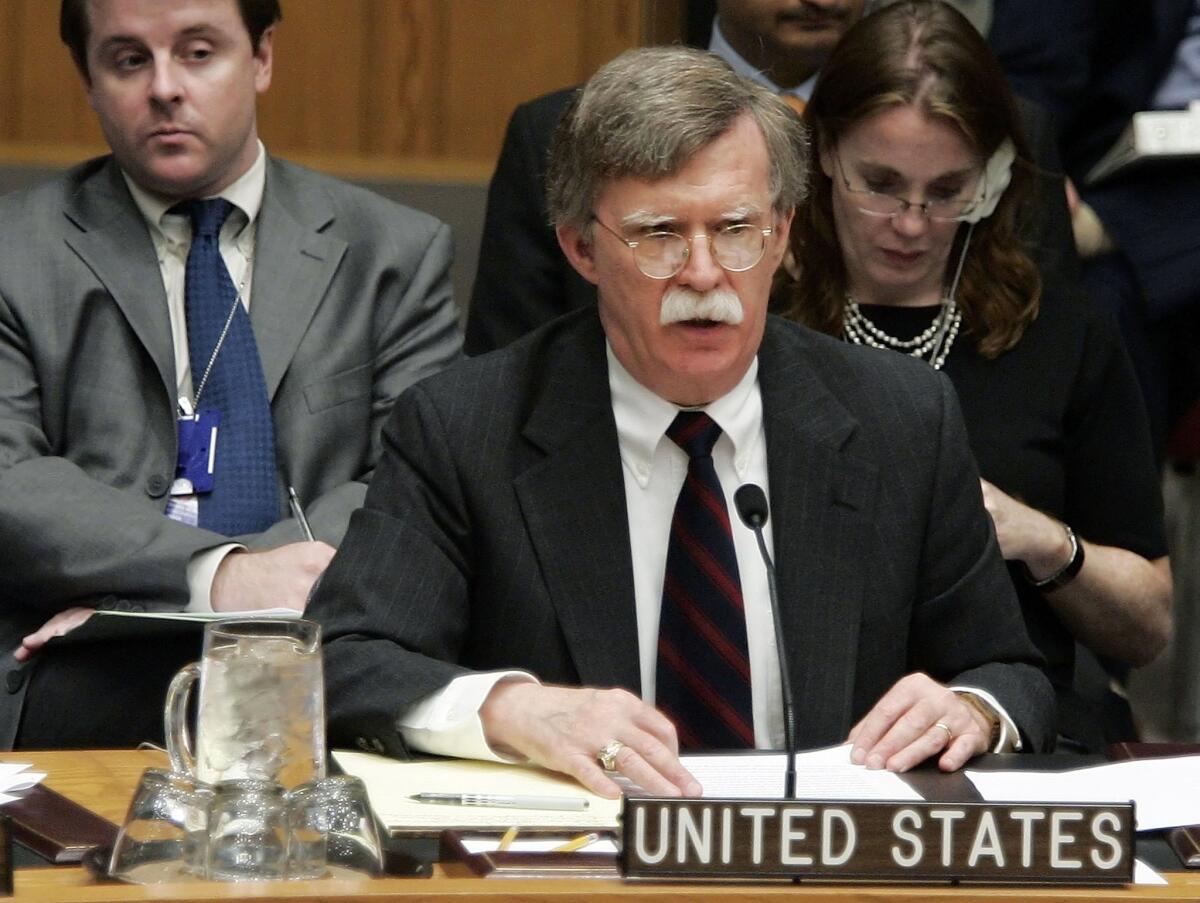Op-Ed: The neocons: They’re back, and on Iran, they’re uncompromising as ever

If nothing succeeds like failure, then the neoconservatives who championed democracy promotion and regime change against Saddam Hussein are very successful indeed. After the Iraq war went south, the reputations of leading neocons such as former Deputy Secretary of Defense Paul Wolfowitz came into disrepute. But as the Obama administration has worked toward its controversial nuclear deal with Iran, the neocons have once again become the dominant voice on foreign policy in the Republican Party.
Writing in National Review on the eve of the agreement, the historian Victor Davis Hanson declared, “Our dishonor in Lausanne, as with Munich, may avoid a confrontation in the present, but our shame will guarantee a war in the near future.”
Over the last few decades, the neocons, who are mostly based at think tanks and magazines in Washington, have come to constitute a kind of military-intellectual complex. Their credo is as sweeping as it is simple: No compromise is ever possible with America’s foreign enemies. Instead, they are championing a liberation doctrine that allows them to present bombing and invading other countries at will as an act of supreme moral virtue.
Exhibit A is Iran. Just as they argued that Saddam Hussein was on the verge of obtaining a nuclear bomb, so leading neocons are rehearsing the same arguments about Tehran. They say the U.S. has no choice but to go on the attack before Iran explodes a nuclear bomb and becomes a regional superpower with the ability to destroy Israel.
“The United States could do a thorough job of destruction, but Israel alone can do what’s necessary,” John Bolton, ambassador to the United Nations during the George W. Bush administration, recently wrote in the New York Times. “Such action should be combined with vigorous American support for Iran’s opposition, aimed at regime change in Tehran.”
Similarly, Sen. Tom Cotton (R-Ark.), who studied under Harvey Mansfield, a neoconservative government professor at Harvard University, is pushing the GOP toward a more hawkish stand. In March, Cotton circulated a letter designed to torpedo the Obama administration’s negotiations with Iran and in a speech at the Heritage Foundation said Congress should be “offering to transfer advanced weapons like surplus B-52 bombers and 30,000-pound bunker-busting bombs to Israel.”
If the neocons are well-represented in Congress, they also have the ear of some leading potential GOP presidential candidates. Former Florida Gov. Jeb Bush’s inner circle includes Wolfowitz. Texas Sen. Ted Cruz has brought on a number of George W. Bush administration officials, including Bolton and former National Security Council official Elliott Abrams, who was involved in the Reagan-era Iran-Contra affair. Other politicians embracing neocon stands include Florida Sen. Marco Rubio and New Jersey Gov. Chris Christie. In May, Christie said that a failure of American leadership means that the world is “almost always filled by evil.”
In fact, the GOP’s approach to foreign affairs has become so uniform that any dissent from within is almost immediately slapped down. Consider former Secretary of State James Baker, who has advised the Bush family for decades. When he recently appeared before the liberal Jewish group J Street to criticize Israeli Prime Minister Benjamin Netanyahu for foot-dragging on reaching an accommodation with the Palestinians, he was denounced on Twitter by William Kristol, the editor of the neocon Weekly Standard. The Bush organization immediately went into damage-control mode, stating that Jeb “disagrees with the sentiments expressed.”
But Sen. Rand Paul’s policy modifications on Israel and other issues are perhaps the starkest sign of neocon sway in the GOP. Ever since Paul entered Congress, neocons have sought to brand him as an isolationist. Now that he’s preparing to run for president, Paul is essentially dumping overboard his previous calls for the GOP to confront the legacy of the Iraq war and pursue a more cautious and pragmatic foreign policy.
Instead, Paul has sidled toward the neocon camp. He’s offered an amendment to cut off funding to the Palestinian Authority, signed the Cotton letter to Tehran and called for boosting defense spending by almost $190 billion over the next two years.
Paul surely knows better, even if his opponents don’t. The unilateral policies the neocons are advocating wouldn’t enhance American security. They would undermine it. George F. Kennan, who devised the pragmatic containment doctrine that brought down the Soviet Union, observed that “a foreign policy aimed at the achievement of total security is the one thing I can think of that is entirely capable of bringing this country to a point where it will have no security at all.”
But as the 2016 campaign heats up, the Republican presidential candidates are likely to adopt ever more bellicose positions as they attempt to surpass one another in brandishing their national security credentials. Whether these positions will appeal to war-weary voters outside Republican primaries is questionable. But for now, it’s clear that the neocons are successfully staging their own surge inside the GOP.
Jacob Heilbrunn is the editor of the National Interest and the author of “They Knew They Were Right: The Rise of the Neocons.”
Follow the Opinion section on Twitter @latimesopinion and Facebook
More to Read
Start your day right
Sign up for Essential California for news, features and recommendations from the L.A. Times and beyond in your inbox six days a week.
You may occasionally receive promotional content from the Los Angeles Times.






